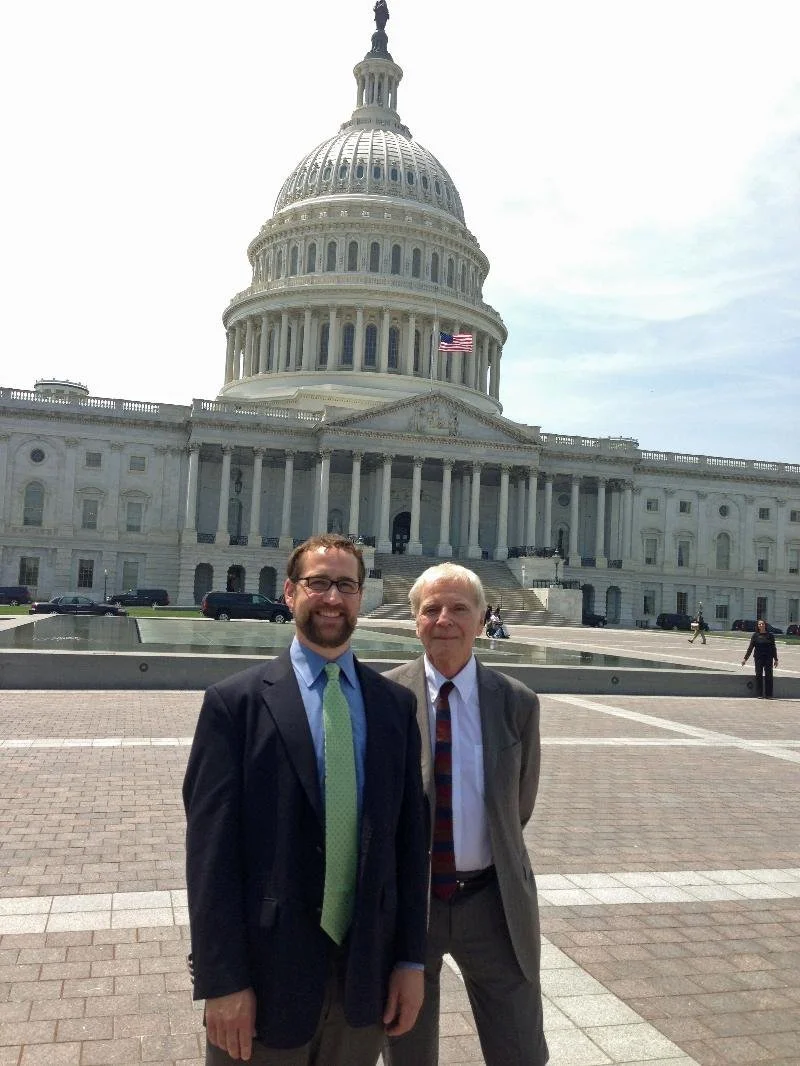Andrew Vincent, Horning - Building Bridges to Affordable Housing
As an affordable housing developer with more than a decade in the field, Andrew Vicent understands that successful endeavors are all about collaboration.
“Problem solving isn’t a solo sport,” Vincent explained. “There’s no one person who understands all the nuances. You need to work with the right partners to ask the right questions.”
“That’s one of the things that attracted me to the Partnership to End Homelessness – having that collaboration and diverse spectrum of perspectives.”
From NASA to Baltimore and Back – An Unlikely Career Path
Vincent’s career began far from the world of affordable housing. After earning a degree in economics with minors in environmental studies and political economy, he joined Booz Allen Hamilton, one of the nation's leading consulting firms. There, he worked on diverse projects ranging from NASA initiatives to nuclear decommissioning.
"I realized my job didn't give me a lot of control over the reports I was working on," Vincent recalled. “I wanted to do something more meaningful that was also intellectually challenging – that allowed me to do something well, while also doing something good.”
At the time, Vincent was living in DC and was a first-hand witness to the urban development taking place across the region.
Inspired by the changing landscape around him, Vincent decided to take an urban planning course at George Washington University, and realized he had a passion for development work. He left Booz Allen to pursue a master’s degree in real estate development from the Columbia University – eventually settling in Baltimore, to write his master’s thesis.
“At that time, Baltimore represented a great opportunity to preserve and rebuild housing stock in a way that helped the community,” Vincent shared. “We had the chance to reinvest in urban areas and reutilize the existing infrastructure, so it worked better for the people that live there!”
Vincent took a job at Affordable Homes & Communities (AHC) Greater Baltimore – an Arlington-based affordable housing developer working to preserve and create affordable housing for low-income individuals, focusing particularly on those earning 0-30% of the Area Median Income (AMI). Vincent was just the second employee hired by the organization after it opened its new office in Baltimore.
Over the next 14 years, the one-person office grew to seven staff members, as the organization expanded its portfolio from managing a few hundred units to several thousand.
The Power of Collaboration in Building Community
"One of the things I love about real estate development is how dynamic it is,” Vincent reflected. “It brings a bunch of different skillsets together - with the community – to build something from the ground up."
Eventually, Vincent’s career brought him back to Washington, where he now serves as the Chief Investment Officer for Horning, one of the oldest and most established real estate development firms in the DMV.
As part of his role, Vincent oversees development and acquisitions and the broader community approach that Horning takes to its investment projects. He also serves on the board of Wesley Housing; a nonprofit affordable rental housing developer working to build and preserve affordable housing across Virginia and DC.
“Development work is a collaboration,” Vincent said of his role. “It requires doing a lot of listening and collaborating with the community members to make sure that we are creating something that will make a lasting difference in people's lives – whether that’s affordable housing, a commercial development, or a combination of both.”
For Vincent, that shared approach is part of what makes the work of the Partnership to End Homelessness so appealing. This past year, Vincent joined the Partnership to End Homelessness Leadership Council– a diverse group of funders, developers, healthcare representatives, and private sector leaders from across the District working to end homelessness in DC.
“I love the collaboration and diverse spectrum of perspectives that exist within the Partnership,” Vincent shared. “Together, we get to bring all the issues to the table and work to understand them and find the best solutions for everyone.”
As a developer, Vincent brings a practical financial perspective to the partnership's mission-driven work. "Change comes because it works on a practical level. While we all have common goals, we need to meet them in a way that is practical and executable from a financial perspective."
The Role of Developers in the Fight Against Homelessness
Developers, Vincent explained, play a critical role in the fight to end homelessness, as they work to increase and improve the housing stock within the community and provide services for residents from across the economic spectrum.
It’s also a role that comes with a high degree of financial risk, as developers struggle to balance covering rising mortgage, operating, and maintenance costs, with providing housing that is both affordable and sustainable. Things like Low-income Housing Tax credits (LIHTC), PSH vouchers, and operating subsidy programs – supported in large part by funding from the DC Government – play a big role in maintaining that sustainability.
"Affordable housing is a team effort,” Vincent said. “Planning and constructing affordable housing is only half of the battle – maintaining it requires collaboration across the community – including both public and private partners.”
This includes improving coordination between developers and homeless service providers operating programs like Rapid Rehousing and Housing First to prevent eviction through improved wrap-around services for low-income residents who receive rent subsidies.
“Development work is a collaboration - it requires listening and working with community members to make sure we are creating something that will make a lasting difference in people’s lives.”
As part of the Partnership to End Homelessness Leadership Council, Vincent has played a key role in advocating the DC government for increased funding for homeless services. He’s also learned about how developers like Horning can play a greater role in the housing landscape.
“I feel a lot of personal value in working in the affordable housing space,” Vincent explained. “While affordable housing is certainly more complex than providing straight market housing, I believe that coming together – as a group – to provide this service is ultimately more rewarding in the long-term.”
The Community Foundation is grateful for Andrew Vincent’s ongoing Leadership, as a member of the Partnership to End Homelessness Leadership Council.
If you would like to support the work of the Partnership to End Homelessness, visit https://donate.thecommunityfoundation.org/give/588288/#!/donation/checkout
For more information on the Partnership to End Homelessness, visit https://www.thecommunityfoundation.org/partnership-to-end-homelessness




